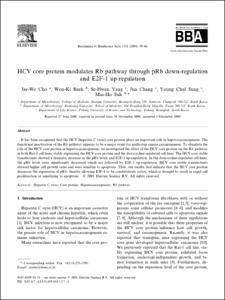HCV core protein modulates Rb pathway through pRb down-regulation and E2F-1 up-regulation
- Keimyung Author(s)
- Baek, Won Ki; Suh, Min Ho
- Department
- Dept. of Microbiology (미생물학)
- Journal Title
- Biochimica et Biophysica Acta (BBA) - Molecular Cell Research
- Issued Date
- 2001
- Volume
- 1538
- Issue
- 1
- Abstract
- It has been recognized that the HCV (hepatitis C virus) core protein plays an important role in hepatocarcinogenesis. The functional inactivation of the Rb pathway appears to be a major event for multi-step cancer carcinogenesis. To elucidate the role of the HCV core protein in hepatocarcinogenesis, we investigated the effect of the HCV core protein on the Rb pathway in both Rat-1 cell lines, stably expressing the HCV core protein and the doxycycline-regulated cell lines. The HCV core stable transfectants showed a dramatic decrease in the pRb levels and E2F-1 up-regulation. In the doxycycline-regulated cell lines, the pRb levels were significantly decreased which are followed by E2F-1 up-regulation. HCV core stable transfectants showed higher cell growth rates and were sensitize to apoptosis. Thus, our results first indicate that the HCV core protein decreases the expression of pRb, thereby allowing E2F-1 to be constitutively active, which is thought to result in rapid cell proliferation or sensitizing to apoptosis.
Keywords
Hepatitis C virus;
Core protein;
Hepatocarcinogenesis;
Rb pathway
- Publisher
- School of Medicine
- Citation
- Jae-We Cho et al. (2001). HCV core protein modulates Rb pathway through pRb down-regulation
and E2F-1 up-regulation. Biochimica et Biophysica Acta (BBA) - Molecular Cell Research, 1538(1), 59–66. doi: 10.1016/S0167-4889(00)00137-3
- Type
- Article
- ISSN
- 0167-4889
- Appears in Collections:
- 1. School of Medicine (의과대학) > Dept. of Microbiology (미생물학)
- 파일 목록
-
-
Download
 oak-aaa-05100.pdf
기타 데이터 / 601.67 kB / Adobe PDF
oak-aaa-05100.pdf
기타 데이터 / 601.67 kB / Adobe PDF
-
Items in Repository are protected by copyright, with all rights reserved, unless otherwise indicated.